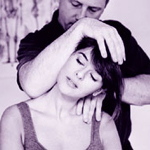 Whiplash-associated disorders (WAD) include heaviness or tingling in the arms, dizziness, ringing in the ears, vision changes, fatigue, poor concentration or memory, and difficulty sleeping. Depression follows if the pain doesn’t get better.
Whiplash-associated disorders (WAD) include heaviness or tingling in the arms, dizziness, ringing in the ears, vision changes, fatigue, poor concentration or memory, and difficulty sleeping. Depression follows if the pain doesn’t get better.
Researchers at the University of Western Ontario, in London conducted this review using a participatory action research (PAR) approach. Continue reading A PAR review of chiropractic to treat WAD →
 Prof. Ernst criticizes chiropractic websites that make claims for treating conditions not support by research.
Prof. Ernst criticizes chiropractic websites that make claims for treating conditions not support by research.
And, the CEO of the World Chiropractic Alliance responds. Continue reading Claims on chiropractic Internet sites that lack support →
 The findings come from a report by the Task Force on Neck Pain and Its Associated Disorders, sanctioned by the United Nations and the World Health Organization.
The findings come from a report by the Task Force on Neck Pain and Its Associated Disorders, sanctioned by the United Nations and the World Health Organization.
Here’s a summary of their conclusions regarding noninvasive treatments. It’s based on a review of the medical literature. Continue reading Best treatments for neck pain →
 The journal Postgraduate Medicine has a good review article on whiplash. Although it is dated (published in 2001), healthcare professionals and other humans should find it informative.
The journal Postgraduate Medicine has a good review article on whiplash. Although it is dated (published in 2001), healthcare professionals and other humans should find it informative.
The most interesting statement in light of an earlier post on this site regarding the intensity of care and recovery is the following.
Continue reading Whiplash and a factor that might affect treatment outcomes →
 An article in the Archives of Internal Medicine reports that patients who see general practitioners and receive a “low intensity of care” recover from their injuries more quickly compared with those who see general practitioners for more intensive care.
An article in the Archives of Internal Medicine reports that patients who see general practitioners and receive a “low intensity of care” recover from their injuries more quickly compared with those who see general practitioners for more intensive care.
- Patients who see chiropractors and a medical practitioner have slower recoveries.
- Those who see only chiropractors and receive a high intensity of care have the slowest recovery.
In other words, the more intensive care provided by a more specialized healthcare provider results in the slowest recover.
Hmm.
Continue reading Chiropractic and whiplash injury →
 “It is unclear whether this, in some cases disabling, condition can be prevented by early intervention,” says Dr. Alice Kongsted from the University of Southern Denmark in Ringe. “Active interventions have been recommended but have not been compared with information only.”
“It is unclear whether this, in some cases disabling, condition can be prevented by early intervention,” says Dr. Alice Kongsted from the University of Southern Denmark in Ringe. “Active interventions have been recommended but have not been compared with information only.”
Now they have. Continue reading Does treatment matter after whiplash? →
Complementary and Alternative Medicine: Fair, Balanced, and to the Point
 Whiplash-associated disorders (WAD) include heaviness or tingling in the arms, dizziness, ringing in the ears, vision changes, fatigue, poor concentration or memory, and difficulty sleeping. Depression follows if the pain doesn’t get better.
Whiplash-associated disorders (WAD) include heaviness or tingling in the arms, dizziness, ringing in the ears, vision changes, fatigue, poor concentration or memory, and difficulty sleeping. Depression follows if the pain doesn’t get better. Once again, less is more.
Once again, less is more.  The findings come from a
The findings come from a